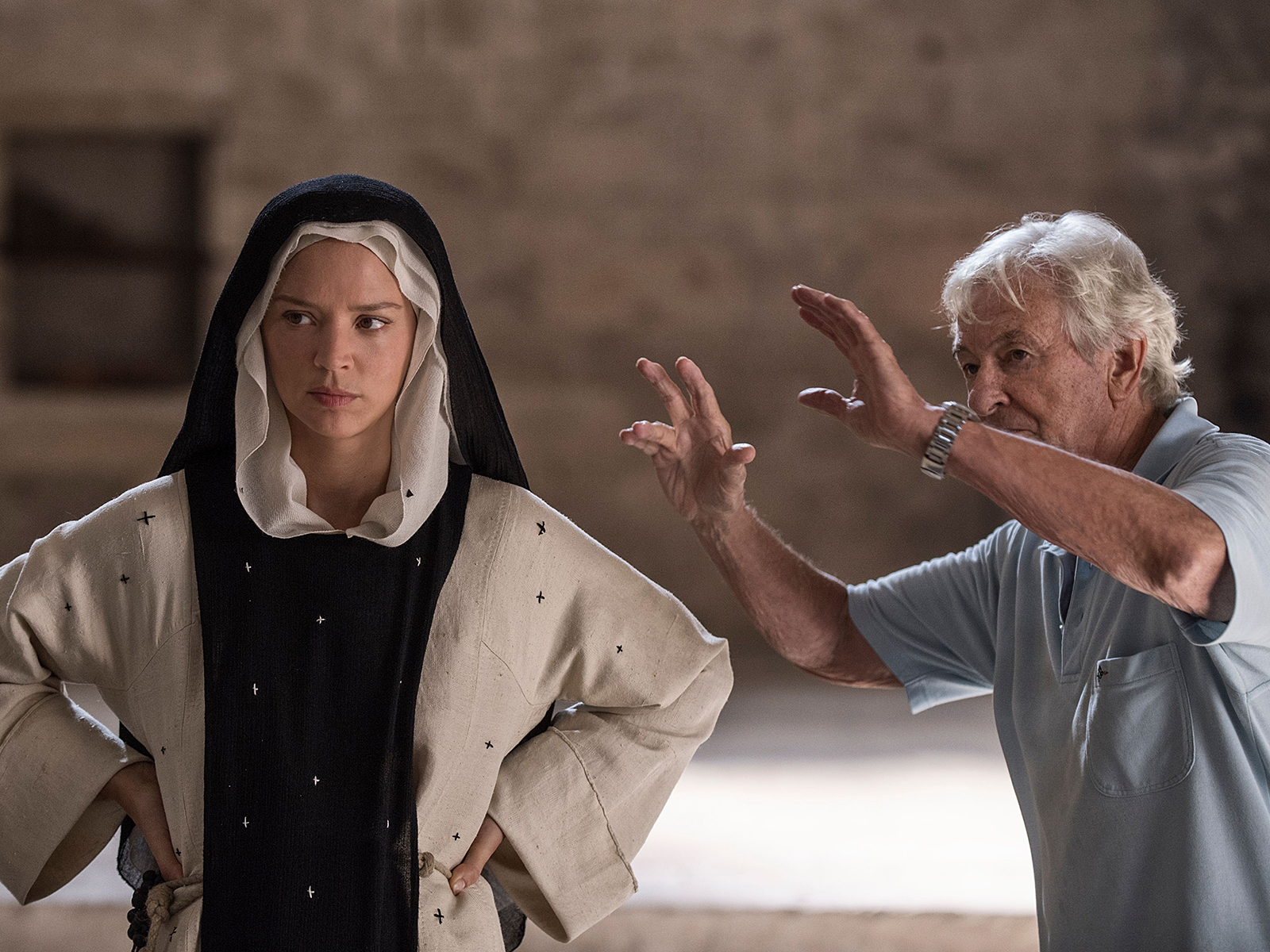
- Festivals
Paul Verhoeven Still on the Edge with “Benedetta”
Paul Verhoeven, the octogenarian (he’s 82) Dutch-born director, remains one of world cinema’s most controversial filmmakers, a status reconfirmed by his latest feature, Benedetta, the most audacious movie to be seen at this year’s Cannes Film Festival.
As an auteur, he is known for blending ultra-graphic violence and bold sexual contents, laced with a darkly humorous social satire. Though his films made in Europe, such as The Fourth Man in 1983, were well received, it’s Verhoeven’s Hollywood oeuvre that has made him both famous and infamous, a director with an increasingly growing cult following.
Working in Hollywood, he directed big-budget, special-effects blockbuster hits, such as the 1987 RoboCop and the 1990 Total Recall, starring Arnold Schwarzenegger. Verhoeven followed those successes with the 1992 provocative erotic thriller Basic Instinct, which premiered at the Cannes Festival. The film’s most notorious scene shows Sharon Stone‘s character in a police interrogation, uncrossing her legs, briefly revealing her vulva (she doesn’t wear underwear).
Verhoeven’s last film, Elle, released in 2016, concerned an educated businesswoman who plays a psychological game of cat-and-mouse with a man who brutally (and repeatedly) rapes her. The critics loved the inventive titillation, and Elle went on to earn two Golden Globes, for Best Foreign Film and for Best Actress for the estimable Isabelle Huppert; she also received an Oscar nomination.
Verhoeven broke the ‘barrier of decency’ in mainstream movies with the aforementioned 1992 picture, and for some, Benedetta is Basic Instinct “with wimples and crucifixes.” The trailer alone has caused consternation, and cinemas in and out of France are already braced for protests. In the two-minute trailer, a novice nun is seen taking a shower, her modesty only “protected” by the flimsiest of transparent gauze curtains.
The role of Benedetta is played by the luminous Belgian actress and former TV presenter Virginie Efira, while her lover is portrayed by Daphne Patakia, another attractive Belgian starlet. The script draws on historian Judith C. Brown’s Immodest Acts: The Life of a Lesbian Nun in Renaissance Italy, which was published in 1986. The tale is based on the true story of an abbess in Renaissance Italy who had a lesbian fling in her convent while experiencing “Godly visions” and being hailed a saint. As the film’s lead character enters – in habit and wimple – the young nun ‘slips,’ causing Benedetta to instinctively reach out, almost touching the novice’s naked breasts before recoiling in pious shame.
Verhoeven has insisted that his latest movie is meant to be “empowering” to women. He lauds Benedetta as an apt heroine for the #MeToo generation, “because she is a woman who embraced her sexuality at a time when being a lesbian could result in public burning at the stake. “Over the years, the story of Benedetta had attained mythical status, passing down from one generation to the next. Professor Brown succeeded in landing the story academic credibility by unearthing new documents in Florence’s state archives, which largely confirmed the story’s authenticity.”
Born in 1591, Benedetta Carlini grew up in a respectable Italian family and entered the Convent of the Mother of God in Pescia, Tuscany, at the age of nine. At the time, middle-class families often “bought” their daughters a place in a convent – it was less costly than marriage and dowry, and it also conferred respectability. Benedetta was made abbess of the convent at the age of 30.
She reported seeing “visions,” including one in which Jesus asked her to be his wife. Benedetta would speak in the voices of angels and underwent a mock marriage ceremony at the convent where only she could “envision” Jesus as her new husband. Soon, she became a sensation, with people flocking to see her. She once showed stigmata on her hands, with bleeding wounds that were similar to those the Bible says Christ had suffered during Crucifixion.
The other nuns were so concerned by her disturbing claims that they reported her actions to the papal council in Rome and were ordered to confine Sister Benedetta to her room. A young novice nun, Sister Bartolomea Crivelli was assigned to watch over her. However, the pair embarked on a lesbian affair, which ended when Bartolomea confessed about their illicit romance.
At a papal inquiry, Bartolomea gave testimony about how Benedetta engaged in sex with her while possessed by the spirit of a “male demon” called Splenditello. The authorities then determined that Benedetta’s revelations were the work of the Devil, not God – sort of “diabolical obsession.” As a result, they stripped the nun of her rank and she was in convent isolation for the remaining 35 years of her life – until her death in 1661.
As noted, the movie contains scenes of lesbian sex, self-flagellation, nun-on-nun kissing, frontal nudity and a dream sequence where Benedetta makes out with Jesus. Verhoeven has predicted outrage over his movie: “I don’t think the film will be scandalous, at least not in Western Europe. However, Americans are likely to see it differently. There is more puritanism in the US. I had experienced that approach with Basic Instinct, and even more so with Showgirls.”
Benedetta, already dubbed a “religiously sinful and absurdist nunsploitation,” premiered in Cannes to rave reviews, but it doesn’t have an American distributor – yet.
Surely, the movie is controversial, but sex sells even better than violence. At this semi post-pandemic phase, the studios are forced to go out of their ways to get adult people back into movie-theatres. What better way than a bit of titillating nunsploitation? Many viewers remember Basic Instinct because of the nudity scenes, but you can watch that film today, nearly three decades later, and it still holds up as a thrilling piece of filmmaking.
Verhoeven is an auteur who takes risks by continuously pushing the envelope – and that’s what all bold and genuine artists do.

